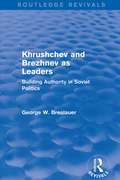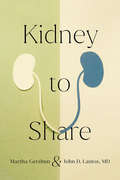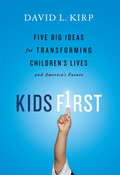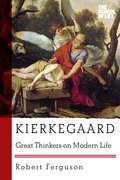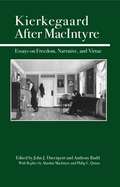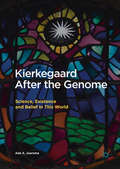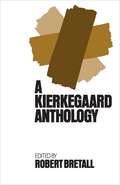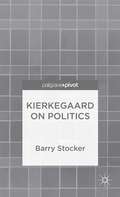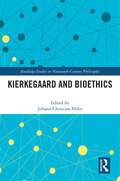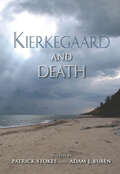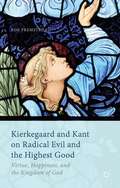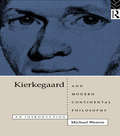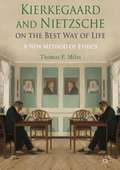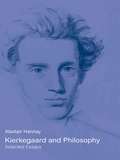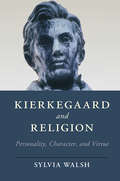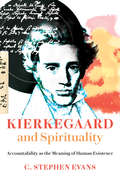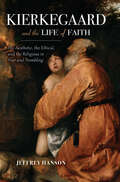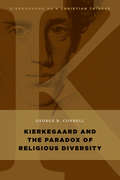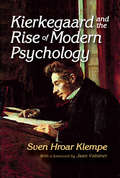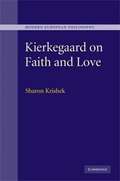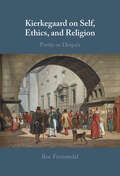- Table View
- List View
Khrushchev and Brezhnev as Leaders (Routledge Revivals): Building Authority in Soviet Politics
by George W. BreslauerFirst published in 1982, this book explores how Khrushchev and Brezhnev manipulated their policies and personal images as they attempted to consolidate their authority as leader. Central issues of Soviet domestic politics are examined: investment priorities, incentive policy, administrative reform, and political participation. The author rejects the conventional images of Khrushchev as an embattled consumer advocate and decentraliser, and of Brezhnev’s leadership as dull and conservative. He looks at how they dealt with the task of devising programs that combined the post-Stalin elite’s goals of consumer satisfaction and expanded political participation with traditional Soviet values.
Kidney to Share (The Culture and Politics of Health Care Work)
by Martha Gershun John D. LantosIn Kidney to Share, Martha Gershun tells the story of her decision to donate a kidney to a stranger. She takes readers through the complex process by which such donors are vetted to ensure that they are physically and psychologically fit to take the risk of a major operation. John D. Lantos, a physician and bioethicist, places Gershun's story in the larger context of the history of kidney transplantation and the ethical controversies that surround living donors. Together, they help readers understand the discoveries that made transplantation relatively safe and effective as well as the legal, ethical, and economic policies that make it feasible. Gershun and Lantos explore the steps involved in recovering and allocating organs. They analyze the differences that arise depending on whether the organ comes from a living donor or one who has died. They observe the expertise—and the shortcomings—of doctors, nurses, and other professionals and describe the burdens that we place on people who are willing to donate. In this raw and vivid book, Gershun and Lantos ask us to consider just how far society should go in using one person's healthy body parts in order to save another person.Kidney to Share provides an account of organ donation that is both personal and analytical. The combination of perspectives leads to a profound and compelling exploration of a largely opaque practice. Gershun and Lantos pull back the curtain to offer readers a more transparent view of the fascinating world of organ donation.
Kids First: Five Big Ideas for Transforming Children's Lives and America's Future
by David KirpA visionary call for renewing, revamping, and re-energizing public support for children--and why doing so is essential to America''s future
Kierkegaard (The\school Of Life Ser.)
by Robert FergusonSoren Kierkegaard was a Danish philosopher, theologian, literary stylist and social critic. Born in 1813 in Copenhagen, his philosophical work addressed living as a single individual and the importance of personal choice. A famously fierce critic of the idealist thinkers of his time, including Hegel, Goethe, and Hans Christian Anderson, he is regarded as the first existentialist philosopher, and his Fear and Trembling is one of the classics of modern philosophy. Here you will find insights from his greatest works, in the "Great Thinkers on Modern Life" series, which highlights ideas most relevant to ordinary, everyday dilemmas.
Kierkegaard After MacIntyre
by Alasdair Macintyre Philip L. Quinn John J. Davenport Anthony RuddIn his extraordinarily influential book on ethics, After Virtue, Alasdair MacIntyre maintained that Kierkegaard's notion of "choosing" to interpret one's choices in ethical terms implies an arbitrary and irrational leap. MacIntyre's critique of Kierkegaard has become the focal point for several new interpretations of Kierkegaard that seek to answer MacIntyre. Kierkegaard After MacIntyre brings together both new and already published articles in this vein, with a new reply by Professor MacIntyre.Kierkegaard After MacIntyre reflects the emergence of a new consensus in Kierkegaard scholarship. This consensus is strongly anti-irrationalist and contemporary neo-Aristotelian virtue ethics, clarifying their common ground as well as their differences.In responding to MacIntyre's 'irrationalist' objection, the authors clarify the sense in which Kierkegaard's own conception of freedom is teleological and suggest that his understanding of the development of ethical personality involves a quest for narrative unity, a commitment to practices involving social values, and a self-understanding conditioned by historical reality-all of which are also central themes in MacIntyre's work on virtue ethics. Despite MacIntyre's diagnosis of Kierkegaard's existential approach to ethics as unsuccessful, some of Kierkegaard's insights may support MacIntyre's own theses."Kierkegaard After MacIntyre is an outstanding book which brings Kierkegaard into direct conversation with one of the most important contemporary philosophers. The conversation contains both lively disagreements and illuminating analyses, all focused on issues of fundamental importance for human life." -C. Stephen Evans, Calvin College". . . this wonderfully edifying collection of essays." -Timothy P. Jackson, Emory University"In addressing MacIntyre's charge that for Kierkegaard the adoption of the ethical can only be a 'cirterionless choice,' this stimulating set of essays by well-known Kierkegaard scholars provides a welcome addition to the literature on Kierkegaardian ethics. Kierkegaard After MacIntyre provides a valuable exploration of the role of reasoning, will, and passion in moral life, as well as of the relation between aesthetic and ethical dimensions of life." -M. Jamie Ferreira, University of Virginia
Kierkegaard After the Genome
by Ada S. JaarsmaThis book brings S#65533;ren Kierkegaard's nineteenth-century existentialist project into our contemporary age, applying his understanding of "freedom" and "despair" to science and science studies, queer, decolonial and critical race theory, and disability studies. The book draws out the materialist dimensions of belief, examining the existential dynamics of phenomena like placebos, epigenetics, pedagogy, and scientific inquiry itself. Each chapter dramatizes the ways in which abstractions like "race" or "genes" and even "belief" are sites of contested practices with pressing political significance. Focusing on the existential dangers posed by neo-liberal and finance capitalist systems, the book brings to life the resources for resistance found within science studies and critical approaches to race, secularity, and disability. Throughout the book, Kierkegaard becomes an ally with ecological and developmental evolutionary theorists, as well as with science studies, critical race, and crip theorists who foreground the relational and impassioned nature of existence.
Kierkegaard Anthology
by Robert BretallThis anthology covers the whole of Kierkegaard's literary career. The selections range from the terse epigrams of the Journal through the famous "Diary of the Seducer" and the "Banquet" scene, in which Søren Kierkegaard reveals his great lyric and dramatic gifts, on to the philosophical and psychological works of his maturity. These are climaxed by the beautiful and moving religious discourses which accompany them; finally, there is the biting satire of his Attack upon "Christendom."This is emphatically not a collection of "snippets," but the cream of Kierkegaard, each selection interesting and intelligible in itself, and all ranking among his most important work. They are so arranged as to convey an idea of his remarkable intellectual development.Contents: A comprehensive anthology from the following works: Either/Or Fear and Trembling Stages on Life's Way Works of Love Concluding Unscientific Postscript Attack upon "Christendom" The Sickness Unto Death Philosophical Fragments and other?
Kierkegaard On Politics
by Barry StockerThis investigation of Kierkegaard as a political thinker with regard to the Danish context, and to his place in the history of political thought, deals with the more direct discussion of politics in Kierkegaard, and the ways in which political ideas are embedded in his literary, aesthetic, ethical, philosophical, and religious thought.
Kierkegaard and Bioethics (Routledge Studies in Nineteenth-Century Philosophy)
by Johann-Christian PõderThis book explores Kierkegaard’s significance for bioethics and discusses how Kierkegaard’s existential thinking can enrich and advance current bioethical debates. A bioethics inspired by Kierkegaard is not focused primarily on ethical codes, principles, or cases, but on the existential 'how' of our medical situation. Such a perspective focuses on the formative ethical experiences that an individual can have in relation to oneself and others when dealing with medical decisions, interventions, and information. The chapters in this volume explore questions like: What happens when medicine and bioethics meet Kierkegaard? How might Kierkegaard’s writings and thoughts contribute to contemporary issues in medicine? Do we need an existential turn in bioethics? They offer theoretical reflections on how Kierkegaard’s existential thinking might contribute to bioethics and apply Kierkegaardian concepts to debates on health and disease, predictive medicine and enhancement, mental illness and trauma, COVID-19, and gender identity. Kierkegaard and Bioethics will be of interest to scholars and advanced students working on Kierkegaard, bioethics, moral philosophy, existential ethics, religious ethics, and the medical humanities.
Kierkegaard and Bioethics (Routledge Studies in Nineteenth-Century Philosophy)
by Johann-Christian PõderThis book explores Kierkegaard’s significance for bioethics and discusses how Kierkegaard’s existential thinking can enrich and advance current bioethical debates.A bioethics inspired by Kierkegaard is not focused primarily on ethical codes, principles, or cases, but on the existential 'how' of our medical situation. Such a perspective focuses on the formative ethical experiences that an individual can have in relation to oneself and others when dealing with medical decisions, interventions, and information. The chapters in this volume explore questions like: What happens when medicine and bioethics meet Kierkegaard? How might Kierkegaard’s writings and thoughts contribute to contemporary issues in medicine? Do we need an existential turn in bioethics? They offer theoretical reflections on how Kierkegaard’s existential thinking might contribute to bioethics and apply Kierkegaardian concepts to debates on health and disease, predictive medicine and enhancement, mental illness and trauma, COVID-19, and gender identity.Kierkegaard and Bioethics will be of interest to scholars and advanced students working on Kierkegaard, bioethics, moral philosophy, existential ethics, religious ethics, and the medical humanities.
Kierkegaard and Death
by Patrick Stokes andssss Adam J. Buben“This impressive [anthology] succeeds admirably at demonstrating how the Kierkegaardian corpus presents . . . a philosophy of finite existence” (Notre Dame Philosophical Reviews).Few philosophers have devoted such sustained, almost obsessive attention to the topic of death as Søren Kierkegaard. Kierkegaard and Death brings together new work on Kierkegaard’s multifaceted discussions of death and provides a thorough guide to the development, in various texts and contexts, of Kierkegaard’s ideas concerning death.Essays by an international group of scholars take up essential topics such as dying to the world, living death, immortality, suicide, mortality and subjectivity, death and the meaning of life, remembrance of the dead, and the question of the afterlife. While bringing Kierkegaard’s philosophy of death into focus, this volume connects Kierkegaard with important debates in contemporary philosophy.
Kierkegaard and Kant on Radical Evil and the Highest Good
by Roe FremstedalKierkegaard and Kant on Radical Evil and the Highest Good is a major study of Kierkegaard's relation to Kant that gives a comprehensive account of radical evil and the highest good, two controversial doctrines with important consequences for ethics and religion. Fremstedal offers an original account of Kierkegaard and his role in the history of philosophy that reconstructs several of his central ideas by relating them to Kant and partially also to contemporary debates. By offering a comparative presentation, the book shows how Kant and Kierkegaard offer different accounts of evil and its complex relations to religious faith and happiness. Fremstedal sheds new light on Kierkegaard's argument against secular thinking, and shows that there are more Kantian elements in Kierkegaard than has been acknowledged. Kierkegaard's use of Kantian ideas is instructive, since it points to problems with Kant's philosophy of religion and indicates how Kantian philosophy can be used to defend religious faith and hope.
Kierkegaard and Modern Continental Philosophy: An Introduction
by Michael WestonIn Kierkegaard and Modern European Philosophy: An Introduction Michael Weston argues that, despite being acknowledged as a precursor to Nietzsche and post-Nietzschean thinkers such as Heidegger and Derrida, the radical nature of Kierkegaard's critique of philosophy has been missed. Weston examines and explains the metaphysical tradition, as exemplified by Plato and Hegel, and the post-metaphysical critiques of Nietzsche, Heidegger and Derrida. He shows how Kierkegaard's ethical critique of philosophy undermines the former and escapes the latter. He considers another ethical critique of philosophy, that of Levinas, before identifying ethics as the non-philosophical site where philosophy can be criticised. Kierkegaard and Modern European Philosophy: An Introduction argues that, by refusing to allow philosophy jurisdiction over ethics and religion, Kieregaard's critique applies as much to modern continental thought as to the metaphysical thought it seeks to undermine.
Kierkegaard and Nietzsche on the Best Way of Life
by Thomas P. MilesKierkegaard and Nietzsche revive an ancient approach to ethics that evaluates different ways of life considered as a whole. Comparing and contrasting their respective ideals of faith and individual sovereignty, this work reveals a valuable new path for contemporary ethics.
Kierkegaard and Philosophy: Selected Essays
by Alastair HannayKierkegaard and Philosophy makes many of the most important papers on Kierkegaard available in one place for the first time. These seventeen essays, written over a period of over twenty years, have all been substantially revised or specially prepared for this collection, with a new introduction by the author.In the first part, Alastair Hannay concentrates on Kierkegaard's central philosophical writings, offering closely text-based accounts of the silent concepts Kierkegaard uses. The second part shows the relevance of other thinkers' treatments of shared themes, pointing out where they differ from Kierkegaard. The concluding chapter provides a reason Kierkegaard himself would give for disagreeing with those who claim his texts are infinitely interpretable.Written by the world's foremost Kierkegaard scholar and translator, Kierkegaard and Philosophy is an indispensible resource for all students of Kierkegaard's work.
Kierkegaard and Religion: Personality, Character, And Virtue (Cambridge Studies In Religion, Philosophy And Society )
by Sylvia WalshNo thinker has reflected more deeply on the role of religion in human life than Søren Kierkegaard, who produced in little more than a decade an astonishing number of works devoted to an analysis of the kind of personality, character, and spiritual qualities needed to become an authentic human being or self. <p><p>Understanding religion to consist essentially as an inward, passionate, personal relation to God or the eternal, Kierkegaard depicts the art of living religiously as a self through the creation of a kaleidoscope of poetic figures who exemplify the constituents of selfhood or the lack thereof. The present study seeks to bring Kierkegaard into conversation with contemporary empirical psychology and virtue ethics, highlighting spiritual dimensions of human existence in his thought that are inaccessible to empirical measurement, as well as challenging on religious grounds the claim that he is a virtue ethicist in continuity with the classical and medieval virtue tradition.<p> Explores and clarifies the concepts of personality, character, and virtue in Kierkegaard's thought.<p> Elucidates the dialectic of jest and earnestness, human agency and divine agency, human striving and grace in Kierkegaard's thought.<p> Relates Kierkegaard's concepts of personality, character, and virtue to alternative approaches in contemporary philosophy, theology, and empirical psychology.
Kierkegaard and Spirituality: Accountability as the Meaning of Human Existence (Kierkegaard as a Christian Thinker)
by C. Stephen EvansWe live spiritually when we live in the presence of God.The Danish philosopher Søren Kierkegaard is often read for his contributions to Christian theology, but he also has much to offer about spirituality—both Christian and more generally human. C. Stephen Evans assesses Kierkegaard&’s belief that true spirituality should be seen as accountability: the grateful recognition of our existence as gift. Spirituality takes on a Christian flavor when one recognizes in Jesus Christ the human incarnation of the God who gives us being. In this clearly written and substantive book a leading scholar on Kierkegaard&’s thought makes Kierkegaard&’s contributions to spirituality accessible not only to philosophers and theologians but to pastors, spiritual directors, and lay Christians. The Kierkegaard and Christian Thought series, coedited by C. Stephen Evans and Paul Martens, aims to promote an enriched understanding of nineteenth-century philosopher-theologian Søren Kierkegaard in relation to other key figures in theology and key theological concepts.
Kierkegaard and the Life of Faith: The Aesthetic, the Ethical, and the Religious in Fear and Trembling
by Jeffrey Hanson“A thorough, considered, and provocative treatment of what justifiably remains Kierkegaard’s most famous book.” —Marginalia Review of BooksSoren Kierkegaard’s masterful work Fear and Trembling interrogates the story of Abraham and Isaac, finding there one of the most profound and critical dilemmas in all of religious philosophy. While several commentaries and critical editions exist, Jeffrey Hanson offers a distinctive approach to this crucial text.Hanson gives equal weight to all three of Kierkegaard’s “problems,” dealing with Fear and Trembling as part of the entire corpus of Kierkegaard’s thought and putting all parts into relation with each other. Additionally, he offers a distinctive analysis of the Abraham story and other biblical texts, giving particular attention to questions of poetics, language, and philosophy, especially as each relates to the aesthetic, the ethical, and the religious.Presented in a thoughtful and fresh manner, Hanson’s claims are original and edifying. This new reading of Kierkegaard will stimulate fruitful dialogue on well-traveled philosophical ground.
Kierkegaard and the Paradox of Religious Diversity (Kierkegaard as a Christian Thinker)
by George B. ConnellSøren Kierkegaard (1813–1855) famously critiqued Christendom — especially the religious monoculture of his native Denmark. But what would he make of the dizzying diversity of religious life today? In this book George Connell uses Kierkegaard’s thought to explore pressing questions that contemporary religious diversity poses. Connell unpacks an underlying tension in Kierkegaard, revealing both universalistic and particularistic tendencies in his thought. Kierkegaard’s paradoxical vision of religious diversity, says Connell, allows for both respectful coexistence with people of different faiths and authentic commitment to one’s own faith. Though Kierkegaard lived and wrote in a context very different from ours, this nuanced study shows that his searching reflections on religious faith remain highly relevant in our world today.
Kierkegaard and the Paradox of Religious Diversity (Kierkegaard as a Christian Thinker)
by George B. ConnellSøren Kierkegaard (1813–1855) famously critiqued Christendom — especially the religious monoculture of his native Denmark. But what would he make of the dizzying diversity of religious life today? In this book George Connell uses Kierkegaard&’s thought to explore pressing questions that contemporary religious diversity poses. Connell unpacks an underlying tension in Kierkegaard, revealing both universalistic and particularistic tendencies in his thought. Kierkegaard&’s paradoxical vision of religious diversity, says Connell, allows for both respectful coexistence with people of different faiths and authentic commitment to one&’s own faith. Though Kierkegaard lived and wrote in a context very different from ours, this nuanced study shows that his searching reflections on religious faith remain highly relevant in our world today.
Kierkegaard and the Problem of Self-Love
by John LippittThe problem of whether we should love ourselves – and if so how – has particular resonance within Christian thought and is an important yet underinvestigated theme in the writings of Søren Kierkegaard. In Works of Love, Kierkegaard argues that the friendships and romantic relationships which we typically treasure most are often merely disguised forms of 'selfish' self-love. Yet in this nuanced and subtle account, John Lippitt shows that Kierkegaard also provides valuable resources for responding to the challenge of how we can love ourselves, as well as others. Lippitt relates what it means to love oneself properly to such topics as love of God and neighbour, friendship, romantic love, self-denial and self-sacrifice, trust, hope and forgiveness. The book engages in detail with Works of Love, related Kierkegaard texts and important recent studies, and also addresses a wealth of wider literature in ethics, moral psychology and philosophy of religion.
Kierkegaard and the Rise of Modern Psychology (History And Theory Of Psychology Ser.)
by Sven Hroar KlempeThis book investigates the Danish philosopher Soren Kierkegaard's (1813�1855) contributions to our understanding of psychology. In Kierkegaard's historical context, psychology was challenged from both scientific and philosophical perspectives. Kierkegaard considered psychology a core discipline central to his understanding of metaphysics as well as theology.The first part examines Kierkegaard and experimental psychology, focusing on Kierkegaard's work explicitly referring to psychology. The second part considers psychology in terms of the German Enlightenment, including Kant's rejection of psychology as a science. The third part discusses how to understand Kierkegaard's psychology today, calling attention to his continuing impact on modern psychology and modern science.Kierkegaard's conception of psychology remains relevant for any discussion of the role of today's psychology. In tracing psychology's evolution after Kant and Kierkegaard, the author finds the discipline has followed two main paths. The dominant path follows Kant's ideals about science, while the other, much narrower trail, has its origin in Kierkegaard.
Kierkegaard and the Theology of the Nineteenth Century
by George PattisonThis study shows how Kierkegaard's mature theological writings reflect his engagement with the wide range of theological positions which he encountered as a student, including German and Danish Romanticism, Hegelianism and the writings of Fichte and Schleiermacher. George Pattison draws on both major and lesser-known works to show the complexity and nuances of Kierkegaard's theological position, which remained closer to Schleiermacher's affirmation of religion as a 'feeling of absolute dependence' than to the Barthian denial of any 'point of contact', with which he is often associated. Pattison also explores ways in which Kierkegaard's theological thought can be related to thinkers such as Heidegger and John Henry Newman, and its continuing relevance to present-day debates about secular faith. His volume will be of great interest to scholars and students of philosophy and theology.
Kierkegaard on Faith and Love
by Sharon KrishekKierkegaard's writings are interspersed with remarkable stories of love, commonly understood as a literary device that illustrates the problematic nature of aesthetic and ethical forms of life, and the contrasting desirability of the life of faith. Sharon Krishek argues that for Kierkegaard the connection between love and faith is far from being merely illustrative. Rather, love and faith have a common structure, and are involved with one another in a way that makes it impossible to love well without faith. Remarkably, this applies to romantic love no less than to neighbourly love. Krishek's original and compelling interpretation of the Works of Love in the light of Kierkegaard's famous analysis of the paradoxicality of faith in Fear and Trembling shows that preferential love, and in particular romantic love, plays a much more important and positive role in his thinking than has usually been assumed.
Kierkegaard on Self, Ethics, and Religion: Purity or Despair
by Roe FremstedalMany of Søren Kierkegaard's most controversial and influential ideas are more relevant than ever to contemporary debates on ethics, philosophy of religion and selfhood. Kierkegaard develops an original argument according to which wholeheartedness requires both moral and religious commitment. In this book, Roe Fremstedal provides a compelling reconstruction of how Kierkegaard develops wholeheartedness in the context of his views on moral psychology, meta-ethics and the ethics of religious belief. He shows that Kierkegaard's influential account of despair, selfhood, ethics and religion belongs to a larger intellectual context in which German philosophers such as Kant and Fichte play crucial roles. Moreover, Fremstedal makes a solid case for the controversial claim that religion supports ethics, instead of contradicting it. His book offers a novel and comprehensive reading of Kierkegaard, drawing on important sources that are little known.
